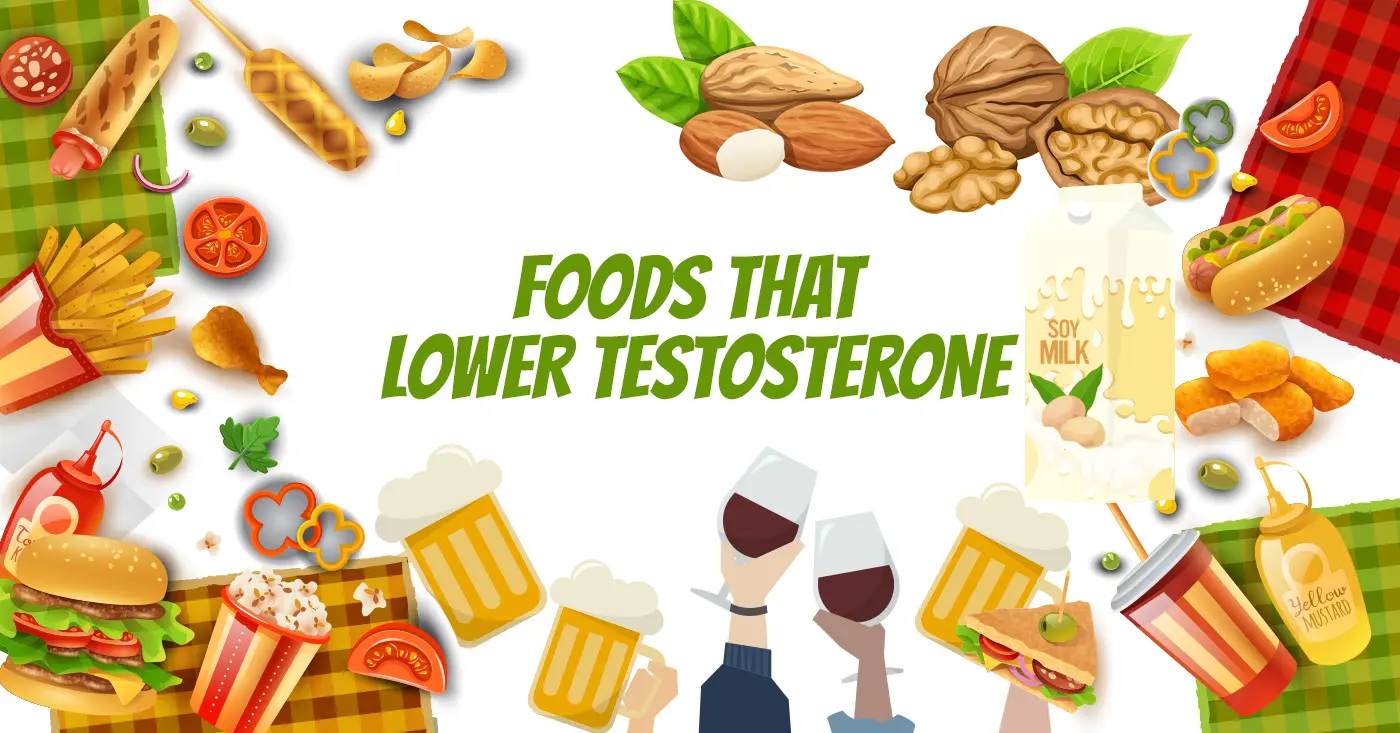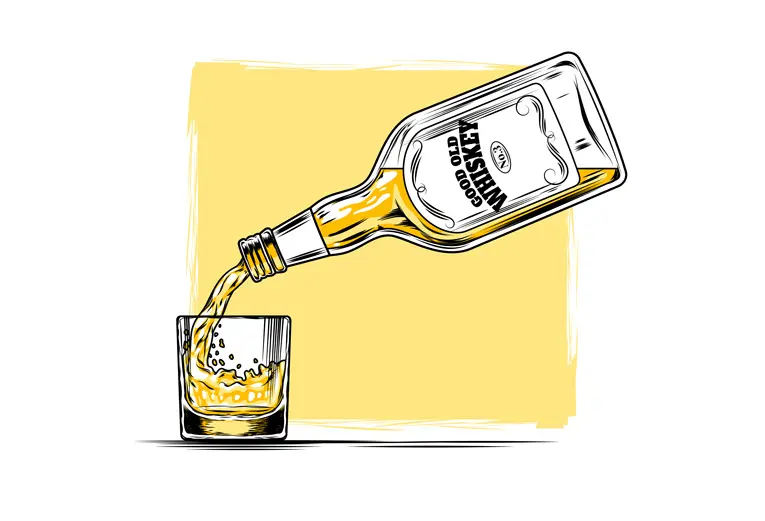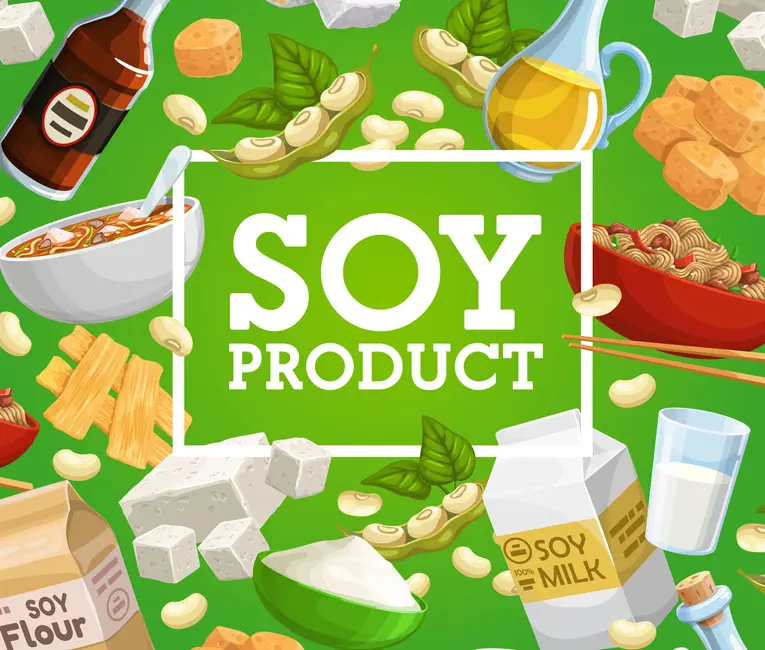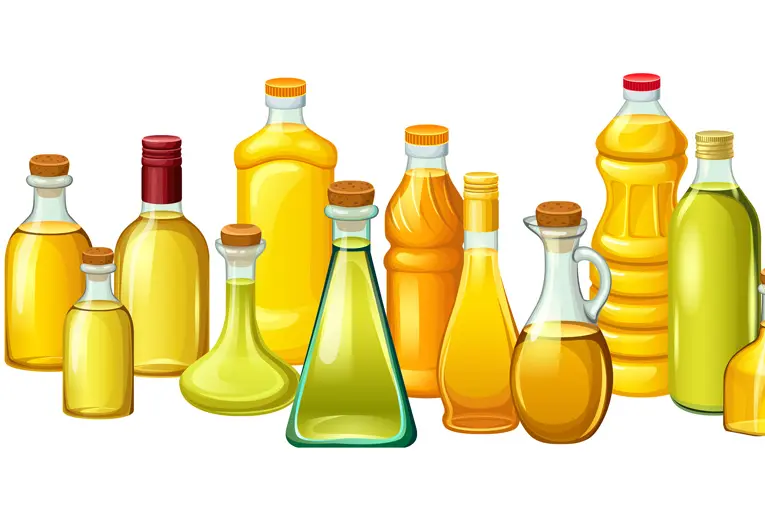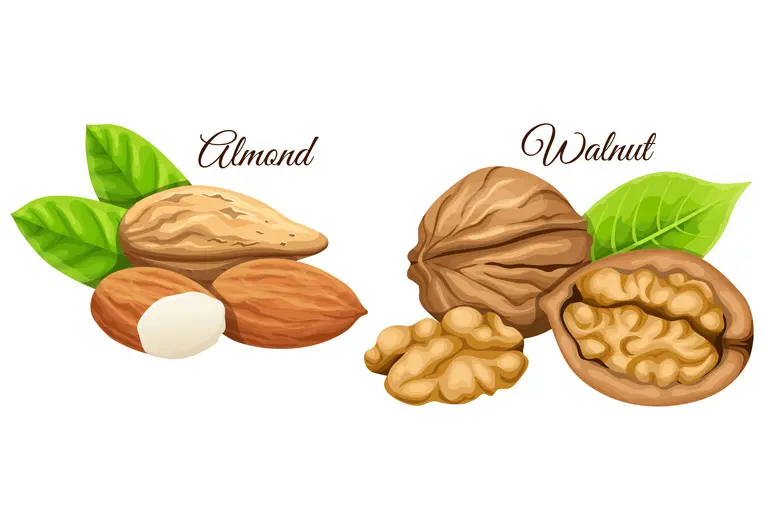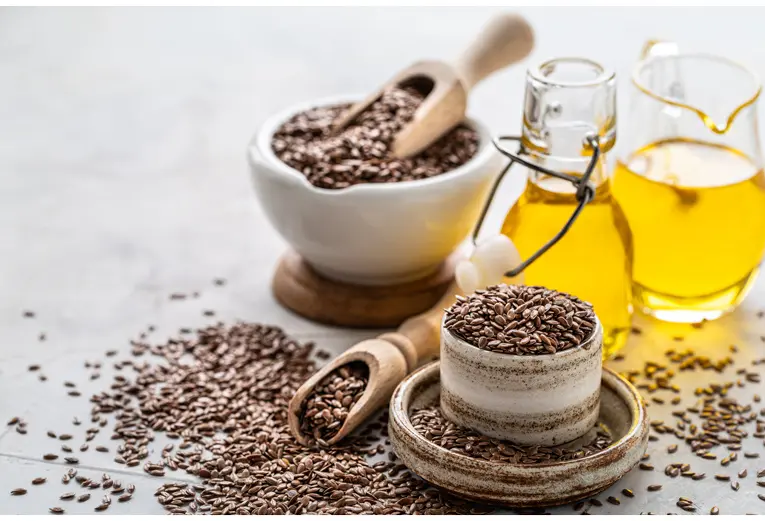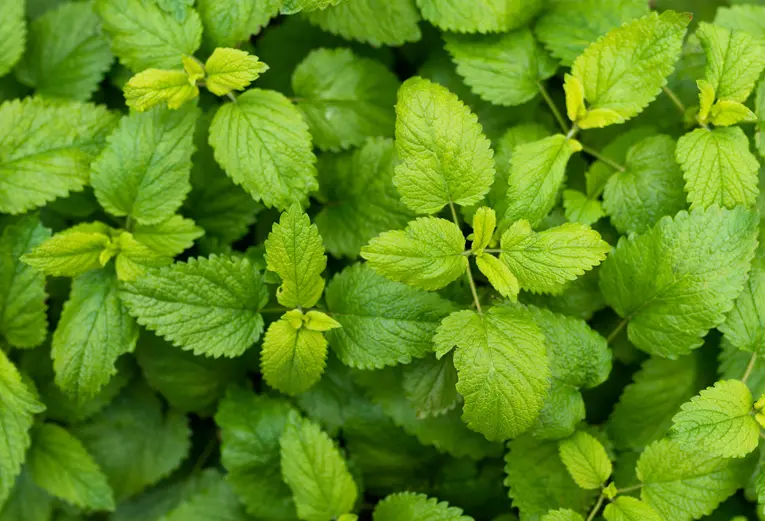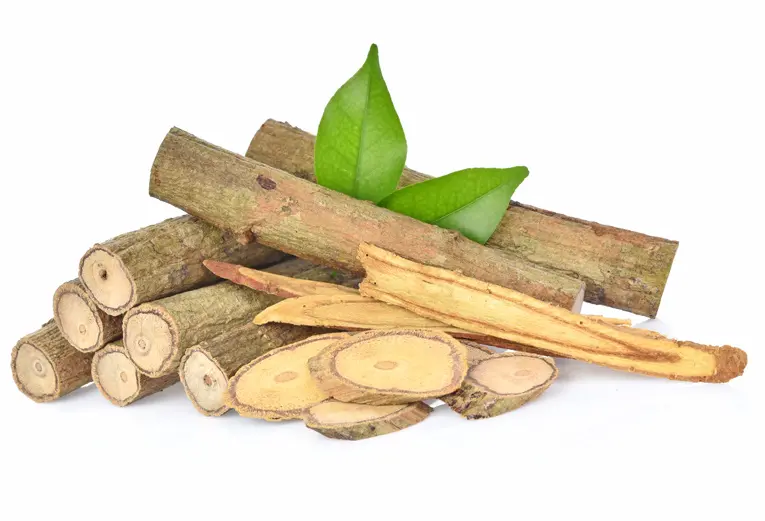Testosterone is what separates the men from the boys… literally. This sex hormone is naturally produced by the body and plays a big role in the development of male characteristics, although, women produce it too, just in smaller amounts (we’ll talk more about testosterone in a minute). And low testosterone, especially in men, is associated with chronic health issues and even premature death. (1)
Now you’re probably wondering what are 8 foods that kill testosterone (since that is the title of this article). But we want to make one thing clear, there likely isn’t a single food that will “kill” testosterone levels. However, it’s a no-brainer that a low-quality diet will affect health, and therefore lower test levels.
Although, there are some foods that may not be the worst, but that studies have shown to be associated with lower testosterone levels.
So, we’ve provided those studies below, but take them with a grain of salt regarding the extent to which they show certain foods to negatively affect test levels. Moderation is usually key as with a lot of things and we realize that. We also suggest getting your test levels checked if you suspect that you have low levels, then possibly change/improve your diet if you believe your nutritional habits may not be as healthy and balanced as it could be.
Alright, let’s get into these 8 foods that kill testosterone (potentially).
1. Refined sugars/highly-processed foods
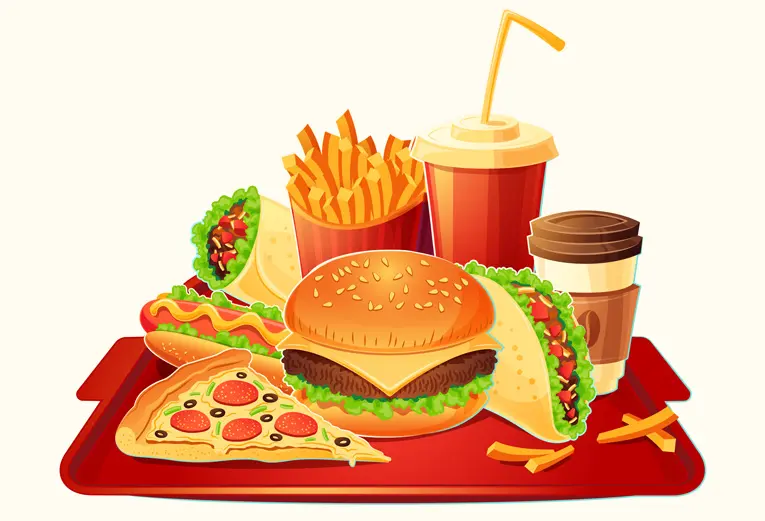
There’s no debate here. Delectable treats, sugar drinks, junk foods, fast foods, highly-processed low-quality meats, and anything in between tend to make up a concerning portion of the typical American diet.
These foods are loaded with calories, simple sugars, saturated fat, sodium, and low-quality protein that, when consumed in excessive amounts over a prolonged period, are not conducive to good health.
It’s well known that consuming a lot of refined carbohydrates and saturated fats is associated with obesity, Type 2 diabetes/reduced insulin sensitivity, high cholesterol/blood pressure, and other common health concerns. But having chronic health issues tends to throw the body out of homeostasis and so it’s easy to see how testosterone levels are affected.
In fact, one scientific review from 2018 found that individuals who prefer Western-style foods and eat out a lot are more likely to have more visceral fat, less muscle mass, low serum total T levels, and a higher chance of developing hypogonadism (lack of testosterone production) (2).
While it’s not necessarily a sin to have dessert, pizza, ice cream, and all of the mouth-watering options that have become a part of our daily or weekly diet, these foods are likely to contribute to lower test and over time, bad health.
Related: 5 High-Carb Foods To Avoid And Their Healthy Alternatives and Carb Cycling Calculator
2. Alcohol
Who doesn’t like to enjoy an alcoholic beverage every now and then? Well, it’s likely not an issue unless you’re consuming it on a regular basis. And actually, moderate wine consumption, more specifically red wine, can be beneficial for your health. Research has shown that wine can provide disease-fighting antioxidants (polyphenols) that can reduce oxidative stress and inflammation, causes of death.
But it can even widen blood vessels, therefore, improving high blood pressure, cholesterol (also increases HDL cholesterol), and preventing heart disease. Plus, it has shown to have beneficial properties for supporting health overall (3, 4).
However, too much alcohol is a bad thing and one of the top causes of mortality in the world. Overconsumption over a prolonged period can negatively overall health that will consequently affect hormone levels.
According to health.gov, women can safely have up to one drink per day while men can safely have up to two drinks per day. But it really depends on the type of alcoholic beverage since they do vary in alcohol content. So, you’ll want to check health.gov or any authority link to determine an appropriate amount for you (5).
Now as far as alcohol’s effects on testosterone, research is mixed. So much so in fact, that according to one study, acute alcoholic intoxication was shown to increase testosterone in women, and decrease levels in men. And this seems to be the case in other studies as well, implying that gender and sexual maturity could be a factor (6, 7).
But more studies need to be carried out to better investigate the relationship between varying alcoholic doses and lowered testosterone levels.
3. Soy
While studies in humans are limited, the possibility of soy lowering testosterone levels has always been a concern.
Common soy food products include soy, tempeh, soy milk, soy protein drinks. These foods are known to contain phytoestrogens that have been associated with having estrogenic effects in the body, therefore causing reduced testosterone levels in men especially (8).
In one study of thirty-five men, individuals who consumed both low and high-isoflavone soy isolate protein for 57 days experienced “decreased DHT and DHT/testosterone with minor effects on other hormones“ (9).
However, in contrast, one review of studies determined no negative effects on testosterone levels in men (10).
Therefore, more studies are needed for conclusive evidence on the potential effects of soy on testosterone levels. But it’s important to note that some research has suggested that soy could potentially have less than desirable effects in the body without altering hormones and that they’ll go away when you stop consuming it.
If you suspect that soy is having certain effects on your body, you might want to switch to something else or get medical advice.
But if it’s working for you, there’s no need to stop eating soy, especially since it has a big role in the typical vegan diet.
4. Vegetable oils
Not all foods with the name “vegetable” are good for you apparently. Vegetable oils such as canola, peanut, corn, and soybean could contribute to lower testosterone. But it’s important to note that these oils contain polyunsaturated fats that are liquid at room temperature unlike saturated fats, and are typically deemed good for heart, brain, and other improvements in health (11).
However, like several of the options on our list of foods that kill testosterone (potentially), healthy doesn’t necessarily mean a certain food won’t mess with testosterone levels.
In some studies, consuming polyunsaturated fats on a frequent basis resulted in decreased testosterone levels. Although, more studies are needed to come to a better conclusion on the potentially negative effects of polyunsaturated fats where it relates to T levels due to relatively smaller sample sizes tested (12, 13).
We should also mention that because oil is high-calorie by nature, consuming too much of it could contribute to weight/fat gain that compromises fat in itself. Moderation is key once again.
5. Nuts
Nuts also contain polyunsaturated fats like vegetable oils, and although several varieties contain beneficial nutrients, consuming certain nuts in higher amounts can increase levels of sex hormone-binding globulin (SHBG), a protein that binds to testosterone. That may sound like a good thing but SHBG is linked to lower free testosterone levels (14).
Almonds and walnuts may be culprits but there needs to be more research to learn which nuts may have the most negative effects on testosterone levels.
6. Flaxseeds
Flaxseed is a nutritional food that provides good fats (Omega-3’s), fiber, that supports good digestion, and nutrients to support overall good health. Not to mention, it contains lignans that may help to reduce cancer and other health factors (15, 16, 17).
But you know the drill… it has been associated with a decrease in testosterone levels.
And actually, both lignans and Omega-3 fatty acids contained in flaxseed may cause a reduction in T levels. Lignans cause testosterone excretion after binding to it in the body and in a study of 78 women with PCOS (Polycystic Ovarian Syndrome), who took 3g/d Omega-3’s for eight weeks, testosterone concentration was significantly lower. (18, 19).
There’s also a study where men with prostate cancer experienced a significant reduction in serum and total testosterone levels after taking 30g/day of flaxseed and eating a lower-fat diet (20).
There are a few other studies that saw similar results.
Read: Healthy Fats – The 7 Functional Fatty Foods You Can Eat For Fat Loss
7. Mint
Mint?… We’re not saying you have to throw your dinner mints and gum in the trash if you want gains.
But according to research, mint may be one of those foods that kill testosterone.
A study found that “high levels” of spearmint has an adverse effect on fertility in adult male rats, not to mention, there are a few studies on rats that found the same effects (21, 22, 23).
Another study found involving 42 women with PCOS found that the group who drank spearmint tea over 30 days experienced a significant reduction in testosterone (24).
There’s isn’t much research in men but these are interesting studies.
8. Licorice root
Licorice root is used in food products such as candies, tobacco products, and other food items. Today it’s used to treat a variety of ailments such as digestive issues, menopause, and viral infections.
One study showed a 26% decrease in mean testosterone in 25 healthy adult men in just a week after consuming 7g/d. And there was a similar result in a study of women who took 3.5g/d and saw a decrease of 32% following a menstrual cycle (25, 26).
Related: 7 Ways To Boost Your Testosterone Naturally also check our top pick for Best Testosterone Boosters.
Wrapping Up
We hope our list of ‘8 foods that kill testosterone’ gave you some insight into nutritional choices that may be worth limiting. There are some interesting studies that have found negative associations between some foods and lower testosterone levels. But we’ll admit that for many of these foods, there needs to be more research to come to any definitive conclusions.
Our best piece of advice is to use your best judgment, keep track of your nutritional choices, and if you’re concerned about your testosterone levels, have them checked.
References
1. Mederos, Michael A.; Bernie, Aaron M.; Scovell, Jason M.; Ramasamy, Ranjith (2015). “Can Serum Testosterone Be Used as a Marker of Overall Health?”. Reviews in Urology. 17 (4): 226–230. ISSN 1523-6161. PMC 4735669. PMID 26839520.
2. Hu, Tzu-Yu; Chen, Yi Chun; Lin, Pei; Shih, Chun-Kuang; Bai, Chyi-Huey; Yuan, Kuo-Ching; Lee, Shin-Yng; Chang, Jung-Su (2018-11-16). “Testosterone-Associated Dietary Pattern Predicts Low Testosterone Levels and Hypogonadism”. Nutrients. 10 (11). doi:10.3390/nu10111786. ISSN 2072-6643. PMC 6266690. PMID 30453566.
3. Copetti, Cristiane; Franco, Fernanda Wouters; Machado, Eduarda da Rosa; Soquetta, Marcela Bromberger; Quatrin, Andréia; Ramos, Vitor de Miranda; Moreira, José Cláudio Fonseca; Emanuelli, Tatiana; Sautter, Cláudia Kaehler; Penna, Neidi Garcia (2018-03-01). “Acute Consumption of Bordo Grape Juice and Wine Improves Serum Antioxidant Status in Healthy Individuals and Inhibits Reactive Oxygen Species Production in Human
Neuron-Like Cells”. Journal of Nutrition and Metabolism. 2018. doi:10.1155/2018/4384012. ISSN 2090-0724. PMC 5852837. PMID 29686894
4. Pavlidou, Eleni; Mantzorou, Maria; Fasoulas, Aristeidis; Tryfonos, Christina; Petridis, Dimitris; Giaginis, Constantinos (2018-08-08). “Wine: An Aspiring Agent in Promoting Longevity and Preventing Chronic Diseases”. Diseases. 6 (3). doi:10.3390/diseases6030073. ISSN 2079-9721. PMC 6165230. PMID 30096779
5. “Appendix 9. Alcohol – 2015-2020 Dietary Guidelines | health.gov”. health.gov. Retrieved 2020-10-01.
6. Frias, J.; Torres, J. M.; Miranda, M. T.; Ruiz, E.; Ortega, E. (2002-03). “Effects of acute alcohol intoxication on pituitary-gonadal axis hormones, pituitary-adrenal axis hormones, beta-endorphin and prolactin in human adults of both sexes”. Alcohol and Alcoholism (Oxford, Oxfordshire). 37 (2): 169–173. doi:10.1093/alcalc/37.2.169. ISSN 0735-0414. PMID 11912073.
7. German, J. B.; Walzem, R. L. (2000). “The health benefits of wine”. Annual Review of Nutrition. 20: 561–593. doi:10.1146/annurev.nutr.20.1.561. ISSN 0199-9885. PMID 10940346.
8. Jargin, Sergei V. (2014-12-15). “Soy and phytoestrogens: possible side effects”. GMS German Medical Science. 12. doi:10.3205/000203. ISSN 1612-3174. PMC 4270274. PMID 25587246.
9. Dillingham, Barbara L.; McVeigh, Brianne L.; Lampe, Johanna W.; Duncan, Alison M. (2005-03). “Soy protein isolates of varying isoflavone content exert minor effects on serum reproductive hormones in healthy young men”. The Journal of Nutrition. 135 (3): 584–591. doi:10.1093/jn/135.3.584. ISSN 0022-3166. PMID 15735098.
10. Hamilton-Reeves, Jill M.; Vazquez, Gabriela; Duval, Sue J.; Phipps, William R.; Kurzer, Mindy S.; Messina, Mark J. (2010-08). “Clinical studies show no effects of soy protein or isoflavones on reproductive hormones in men: results of a meta-analysis”. Fertility and Sterility. 94 (3): 997–1007. doi:10.1016/j.fertnstert.2009.04.038. ISSN 1556-5653. PMID 19524224.
11. Publishing, Harvard Health. “The truth about fats: the good, the bad, and the in-between”. Harvard Health.
Retrieved 2020-10-01.
12. Nagata, C.; Takatsuka, N.; Kawakami, N.; Shimizu, H. (2000). “Relationships between types of fat consumed and serum estrogen and androgen concentrations in Japanese men”. Nutrition and Cancer. 38 (2): 163–167. doi:10.1207/S15327914NC382_4. ISSN 0163-5581. PMID 11525593.
13. Volek, J. S.; Kraemer, W. J.; Bush, J. A.; Incledon, T.; Boetes, M. (1997-01). “Testosterone and cortisol in relationship to dietary nutrients and resistance exercise”. Journal of Applied Physiology (Bethesda, Md.: 1985). 82 (1): 49–54. doi:10.1152/jappl.1997.82.1.49. ISSN 8750-7587. PMID 9029197.
14. Selby, C. (1990-11). “Sex hormone binding globulin: origin, function and clinical significance”. Annals
of Clinical Biochemistry. 27 ( Pt 6): 532–541. doi:10.1177/000456329002700603. ISSN 0004-5632. PMID 2080856.
15. Selby, C. (1990-11). “Sex hormone binding globulin: origin, function and clinical significance”. Annals
of Clinical Biochemistry. 27 ( Pt 6): 532–541. doi:10.1177/000456329002700603. ISSN 0004-5632. PMID 2080856.
16. Mason, Julie K.; Thompson, Lilian U. (2014-06). “Flaxseed and its lignan and oil components: can they play a role in reducing the risk of and improving the treatment of breast cancer?”. Applied Physiology, Nutrition, and Metabolism = Physiologie Appliquee, Nutrition Et Metabolisme. 39 (6): 663–678. doi:10.1139/apnm-2013-0420. ISSN 1715-5320. PMID 24869971.
17. Demark-Wahnefried, Wendy; Polascik, Thomas J.; George, Stephen L.; Switzer, Boyd R.; Madden, John F.; Ruffin, Mack T.; Snyder, Denise C.; Owzar, Kouros; Hars, Vera; Albala, David M.; Walther, Philip J. (2008-12). “Flaxseed Supplementation (not Dietary Fat Restriction) Reduces Prostate Cancer Proliferation Rates in Men Presurgery”. Cancer epidemiology, biomarkers & prevention : a publication of the American Association for Cancer Research, cosponsored by the American Society of Preventive Oncology. 17 (12): 3577–3587. doi:10.1158/1055-9965.EPI-08-0008. ISSN 1055-9965. PMC 2703189. PMID 19064574.
18. Adlercreutz, H.; Höckerstedt, K.; Bannwart, C.; Bloigu, S.; Hämäläinen, E.; Fotsis, T.; Ollus, A. (1987). “Effect
of dietary components, including lignans and phytoestrogens, on enterohepatic circulation and liver metabolism of estrogens and on sex hormone binding globulin (SHBG)”. Journal of Steroid Biochemistry. 27(4–6): 1135–1144. doi:10.1016/0022-4731(87)90200-7. ISSN 0022-4731. PMID 2826899.
19. Nadjarzadeh, Azadeh; Dehghani Firouzabadi, Razieh; Vaziri, Niloofar; Daneshbodi, Hoorieh; Lotfi, Mohammad Hassan; Mozaffari-Khosravi, Hassan (2013-8). “The effect of omega-3 supplementation on androgen profile and menstrual status in women with polycystic ovary syndrome: A randomized clinical trial”. Iranian Journal of Reproductive Medicine. 11 (8): 665–672. ISSN 1680-6433. PMC 3941370. PMID 24639805.
20. Demark-Wahnefried, W.; Price, D. T.; Polascik, T. J.; Robertson, C. N.; Anderson, E. E.; Paulson, D. F.; Walther, P. J.; Gannon, M.; Vollmer, R. T. (2001-07). “Pilot study of dietary fat restriction and flaxseed supplementation in men with prostate cancer before surgery: exploring the effects on hormonal levels, prostate-specific antigen, and histopathologic features”. Urology. 58 (1): 47–52. doi:10.1016/s0090-4295(01)01014-7. ISSN 1527-9995.
21. Demark-Wahnefried, W.; Price, D. T.; Polascik, T. J.; Robertson, C. N.; Anderson, E. E.; Paulson, D. F.; Walther, P. J.; Gannon, M.; Vollmer, R. T. (2001-07). “Pilot study of dietary fat restriction and flaxseed supplementation in men with prostate cancer before surgery: exploring the effects on hormonal levels, prostate-specific antigen, and histopathologic features”. Urology. 58 (1): 47–52. doi:10.1016/s0090-4295(01)01014-7. ISSN 1527-9995. PMID 11445478.
22. Sampaio, Francisco J. B. (2004-07). “Effects of peppermint teas on plasma testosterone, follicle-stimulating hormone, and luteinizing hormone levels and testicular tissue in rats”. International Braz J Urol: Official Journal of the Brazilian Society of Urology. 30 (4): 350–351. ISSN 1677-5538. PMID 15679984.
23. Sadeghi Ataabadi, Mahmood; Alaee, Sanaz; Bagheri, Mohammad Jafar; Bahmanpoor, Soghra (2017-12). “Role
of Essential Oil of Mentha Spicata (Spearmint) in Addressing Reverse Hormonal and Folliculogenesis Disturbances in a Polycystic Ovarian Syndrome in a Rat Model”. Advanced Pharmaceutical Bulletin. 7 (4): 651–654. doi:10.15171/apb.2017.078. ISSN 2228-5881. PMC 5788221. PMID 29399556.
24. Grant, Paul (2010-02). “Spearmint herbal tea has significant anti-androgen effects in polycystic ovarian syndrome. A randomized controlled trial”. Phytotherapy research: PTR. 24 (2): 186–188. doi:10.1002/ptr.2900. ISSN 1099-1573. PMID 19585478.
25. Armanini, D.; Bonanni, G.; Mattarello, M. J.; Fiore, C.; Sartorato, P.; Palermo, M. (2003-09). “Licorice
consumption and serum testosterone in healthy man”. Experimental and Clinical Endocrinology & Diabetes: Official Journal, German Society of Endocrinology [and] German Diabetes Association. 111 (6): 341–343. doi:10.1055/s-2003-42724. ISSN 0947-7349. PMID 14520600.
26. Armanini, Decio; Mattarello, Mee Jung; Fiore, Cristina; Bonanni, Guglielmo; Scaroni, Carla; Sartorato, Paola; Palermo, Mario (2004-10). “Licorice reduces serum testosterone in healthy women”. Steroids. 69 (11–12): 763–766. doi:10.1016/j.steroids.2004.09.005. ISSN 0039-128X. PMID 15579328.
Written by Matthew Magnante.
Medically reviewed by: Dr. Malik, DPT.
Tip: If you're signed in to Google, tap Follow.


